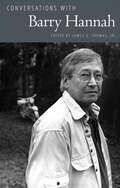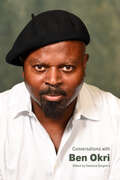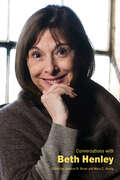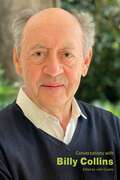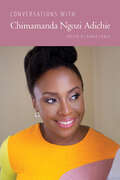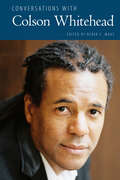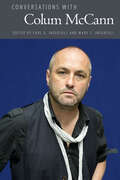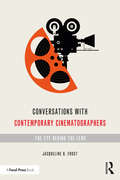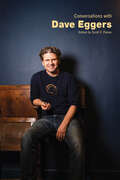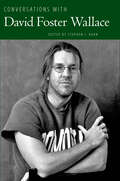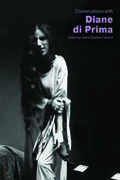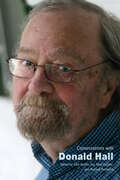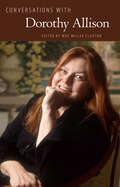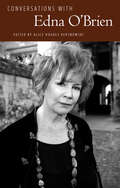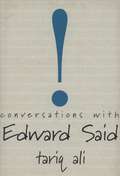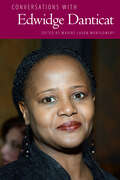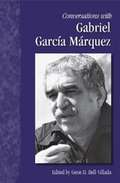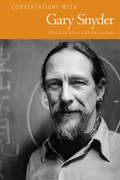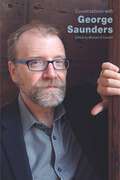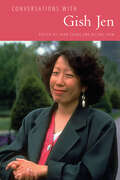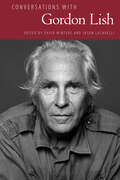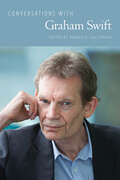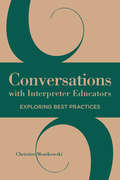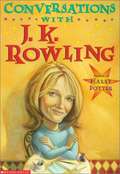- Table View
- List View
Conversations with Barry Hannah (Literary Conversations Series)
by James G. Thomas Jr.Between 1972 and 2001, Barry Hannah (1942–2010) published eight novels and four collections of short stories. A master of short fiction, Hannah is considered by many to be one of the most important writers of modern American literature. His writing is often praised more for its unflinching use of language, rich metaphors, and tragically damaged characters than for plot. “I am doomed to be a lengthy fragmentist,” he once claimed. “In my thoughts, I don't ever come on to plot in a straightforward way.” Conversations with Barry Hannah collects interviews published between 1980 and 2010. Within them Hannah engages interviewers in discussions on war and violence, masculinity, religious faith, abandoned and unfinished writing projects, the modern South and his time spent away from it, the South's obsession with defeat, the value of teaching writing, and post-Faulknerian literature. Despite his rejection of the label “southern writer,” Hannah's work has often been compared to that of fellow Mississippian William Faulkner, particularly for each author's use of dark humor and the Southern Gothic tradition in their work. Notwithstanding these comparisons, Hannah's voice is distinctly and undeniably his own, a linguistic tour de force.
Conversations with Ben Okri (Literary Conversations Series)
by Vanessa GuigneryConversations with Ben Okri collects twenty-six interviews that range from 1986 to 2023 and reflect the international resonance of Nigerian writer Ben Okri's work. The reader is given access to the various phases of Okri’s life and career, beginning with his childhood (b. 1959) and upbringing in Nigeria and the publication of his early short stories and novels. The interviews also explore the tremendous success of The Famished Road (for which Okri became the first Black African writer to receive the Booker Prize in 1991) and the dazzling creativity of his subsequent work in a multiplicity of literary genres. The volume offers insight into the writer’s creative process and his unique views on literature, history, memory, politics, freedom, spirituality, and environmental issues. The conversations often veer into fascinating philosophical discussions about the nature of art and reality, the value of myth, and the dynamics of storytelling.Since the publication of his first novel in 1980, Okri has encouraged his readers to open their minds and eyes to new modes of perceiving reality. Convinced of the universality of art, he has been intent on redreaming the world from a variety of perspectives in poems, essays, short stories, novels, and plays written over a period of more than forty years. Throughout his career, Ben Okri has never stopped experimenting with new forms, creating the stoku (a mixture of short story and haiku), endowing his fictional and nonfictional creations with poetic undertones, and collaborating with visual artists, musicians, and dancers.
Conversations with Beth Henley (Literary Conversations Series)
by Jackson R. Bryer and Mary C. HartigWith roots in the American South, Beth Henley (b. 1952) has for four decades been a working playwright and screenwriter. Winner of the Pulitzer Prize in 1981 at the age of twenty-eight, Henley so far has written twenty-five produced plays that are always original, usually darkly comic, and often experimental. In these interviews, Henley speaks of the plays, from her early crowd-pleasers, Crimes of the Heart and The Miss Firecracker Contest, to her more experimental plays, including The Debutante Ball and Control Freaks, to her brilliant and time-bending play, The Jacksonian. Henley is a master at writing about the duality of human experience—the beautiful and the grotesque, the cruel and the loving. This duality provokes in Henley both amazement and compassion. She discusses here not only her admiration for Chekhov and other influences, but also her process of bringing a play from notebooks of images and bits of dialogues through rumination, writing, and rewriting to rehearsals and previews. The interviews range from 1981, just before she won the Pulitzer Prize, to 2020 and cover nearly forty years of a creative life, which, as Henley remarks in the most recent interview, is “such a life worth living: to be in tune with the creative process.”
Conversations with Billy Collins (Literary Conversations Series)
by John CusatisBilly Collins “puts the ‘fun’ back in profundity,” says poet Alice Fulton. Known for what he has called “hospitable” poems, which deftly blend wit and erudition, Collins (b. 1941) is a poet of nearly unprecedented popularity. His work is also critically esteemed and well represented in The Norton Anthology of American Literature. An English professor for five decades, Collins was fifty-seven when his poetry began gathering considerable international attention. Conversations with Billy Collins chronicles the poet’s career beginning with his 1998 interview with Terry Gross on Fresh Air, which exponentially expanded his readership, three years prior to his being named United States Poet Laureate. Other interviewers range from George Plimpton, founder of the Paris Review, to Pulitzer Prize–winning poet Henry Taylor to a Presbyterian pastor, a physics professor, and a class of AP English Literature students. Over the course of the twenty-one interviews included in the volume, Collins discusses such topics as discovering his persona, that consistently affable voice that narrates his often wildly imaginative poems; why poetry is so loved by children but often met with anxiety by high school students; and his experience composing a poem to be recited during a joint session of Congress on the first anniversary of 9/11, a tragedy that occurred during his tenure as poet laureate. He also explores his love of jazz, his distaste for gratuitously difficult poetry and autobiographical poems, and his beguiling invention of a mock poetic form: the paradelle. Irreverent, incisive, and deeply life-affirming—like his twelve volumes of poetry—these interviews, gathered for the first time in one volume, will edify and entertain readers in the way his sold-out readings have done for the past quarter century.
Conversations with Chimamanda Ngozi Adichie (Literary Conversations Series)
by Daria TuncaNigerian author Chimamanda Ngozi Adichie (b. 1977) is undoubtedly one of the most widely acclaimed African writers of the twenty-first century. Best known for her insightful fiction, viral TED talks, and essays on feminism, she is also an outspoken intellectual. As she puts it in an interview with Lia Grainger, in her characteristically straightforward style: “I have things to say and I’ll say them.”Conversations with Chimamanda Ngozi Adichie is the first collection of interviews with the writer. Covering fifteen years of conversations, the interviews start with the publication of Adichie’s first novel, Purple Hibiscus (2003), and end in late 2018, by which time Adichie had become one of the most prominent figures on the international literary scene. As both scholars and passionate readers of the author’s work are bound to find out, the opinions shared by Adichie in interviews over the years coalesce into a fascinating portrait that presents both abiding features and gradual transformations.Reflecting the political and emotional scope of Adichie’s work, the conversations contained in this volume cover a wide range of topics, including colonialism, race, immigration, and feminism. Collectively, these interviews testify both to the author’s ardent wish to strive for a more just and equal world, and to her deep interest in exploring our common humanity. As Adichie says in her 2009 interview with Joshua Jelly-Schapiro: “When people call me a novelist, I say, well, yes. I really think of myself as a storyteller.” This book invites Chimamanda Ngozi Adichie to tell her own literary story.
Conversations with Colson Whitehead (Literary Conversations Series)
by Derek C. MausSince the publication of his first novel, The Intuitionist, in 1999, Colson Whitehead (b. 1969) has been considered an important new voice in American literature. His seven subsequent books have done little to contradict that initial assessment, especially after 2016’s The Underground Railroad spent many weeks at the top of bestseller lists and won numerous major literary awards, including the Pulitzer Prize.Ranging from 2001 to 2016, the twenty-three interviews collected in Conversations with Colson Whitehead reveal the workings of one of America’s most idiosyncratic and most successful literary minds. Through these interviews, it is clear that none of this well-earned praise has gone to his head. If anything, he still seems inclined to present himself as an awkward misfit who writes about such offbeat subject matter as rival groups of elevator inspectors, the insufficiency of off-brand “flesh-colored” bandages, or a literalized alternate version of the Underground Railroad.Whitehead speaks at length about matters related to his craft, including his varied literary and nonliterary influences, the particular methods of researching and writing that have proved valuable to telling his stories, and the ways in which he has managed the rollercoaster life of a professional writer. He also opens up about popular culture, particularly the unconventional blend of music, genre fiction, B movies, and comic books that he gleefully identifies as a passion that has persisted for him since his childhood.
Conversations with Colum McCann (Literary Conversations Series)
by Earl G. Ingersoll and Mary C. IngersollConversations with Colum McCann brings together eighteen interviews with a world-renowned fiction writer. Ranging from his 1994 literary debut, Fishing the Sloe-Black River, to a previously unpublished interview conducted in 2016, these interviews represent the development as well as the continuation of McCann's interests. The number and length of the later conversations attest to his star-power. Let the Great World Spin earned him the National Book Award and promises to become a major motion picture. His most recent novel, TransAtlantic, has awed readers with its dynamic yoking of the 1845-46 visit of Frederick Douglass to Ireland, the 1919 first nonstop transatlantic flight of Alcock and Brown, and Senator George Mitchell's 1998 efforts to achieve a peace accord in Northern Ireland. An extensive interview by scholar Cécile Maudet is included here, as is an interview by John Cusatis, who wrote Understanding Colum McCann, the first extensive critical analysis of McCann's work. An author who actually enjoys talking about his work, McCann (b. 1965) offers insights into his method of writing, what he hopes to achieve, as well as the challenge of writing each novel to go beyond his accomplishments in the novel before. Readers will note how many of his responses include stories in which he himself is the object of the humor and how often his remarks reveal insights into his character as a man who sees the grittiness of the urban landscape but never loses faith in the strength of ordinary people and their capacity to prevail.
Conversations with Contemporary Cinematographers: The Eye Behind the Lens
by Jacqueline B FrostPacked with gems of wisdom from the current 'masters of light’, this collection of conversations with twenty leading contemporary cinematographers provides invaluable insight into the art and craft of cinematography. Jacqueline Frost’s interviews provide unprecedented insight into the role as cinematographers discuss selecting projects, the conceptual and creative thinking that goes into devising a visual strategy, working with the script, collaborating with leading directors such as Martin Scorcese, Spike Lee, and Ava DuVernay, the impact of changing technology, and offer advice for aspiring cinematographers. Interviews include Maryse Alberti, John Bailey, Robert Elswit, Kirsten Johnson, Kira Kelly, Ellen Kuras, Edward Lachman, Matthew Libatique, John Lindley, Seamus McGarvey, Reed Morano, Polly Morgan, Rachel Morrison, Rodrigo Prieto, Cynthia Pusheck, Harris Savides, Nancy Schrieber, John Seale, Sandi Sissel, Dante Spinotti, Salvatore Totino, Amy Vincent and Mandy Walker. Filled with valuable information and advice for aspiring cinematographers, directors, and filmmakers, this is essential reading for anyone interested in the art and craft of cinematography.
Conversations with Dana Gioia (Literary Conversations Series)
by John ZhengConversations with Dana Gioia is the first collection of interviews with the internationally known poet and public intellectual, covering every stage of his busy, polymathic career. Dana Gioia (b. 1950) has made many contributions to contemporary American literature and culture, including but not limited to crafting a personal poetic style suited to the age; leading the revival of rhyme, meter, and narrative through New Formalism; walloping the “intellectual ghetto” of American poetry through his epochal article “Can Poetry Matter?”; helping American poetry move forward by organizing influential conferences; providing public service and initiating nationwide arts projects such as Poetry Out Loud through his leadership of the National Endowment for the Arts; and editing twenty best-selling literary anthologies widely used in American classrooms. Taken together, the twenty-two collected interviews increase our understanding of Gioia’s poetry and poetics, offer aesthetic pleasure in themselves, and provide a personal encounter with a writer who has made poetry matter. The book presents the actual voice of Dana Gioia, who speaks of his personal and creative life and articulates his unique vision of American culture and poetry.
Conversations with Dave Eggers (Literary Conversations Series)
by Scott F. ParkerIt’s been barely twenty years since Dave Eggers (b. 1970) burst onto the American literary scene with the publication of his memoir, A Heartbreaking Work of Staggering Genius. In that time, he has gone on to publish several books of fiction, a few more books of nonfiction, a dozen books for children, and many harder-to-classify works. In addition to his authorship, Eggers has established himself as an influential publisher, editor, and designer. He has also founded a publishing company, McSweeney’s; two magazines, Might and McSweeney’s Quarterly Concern; and several nonprofit organizations. This whirlwind of productivity, within publishing and beyond, gives Eggers a unique standing among American writers: jack of all trades, master of same.The interviews contained in Conversations with Dave Eggers suggest the range of Eggers’s pursuits—a range that is reflected in the variety of the interviews themselves. In addition to the expected interviews with major publications, Eggers engages here with obscure magazines and blogs, trade publications, international publications, student publications, and children from a mentoring program run by one of his nonprofits. To read the interviews in sequence is to witness Eggers’s rapid evolution. The cultural hysteria around Eggers’s memoir and his complicated relationship with celebrity are clear in many of the earlier interviews. From there, as the buzz around him mellows, Eggers responds in kind, allowing writing and his other endeavors to come to the fore of his conversations. Together, these interviews provide valuable insight into a driving force in contemporary American literature.
Conversations with David Foster Wallace (Literary Conversations Series)
by Stephen J. BurnAcross two decades of intense creativity, David Foster Wallace (1962-2008) crafted a remarkable body of work that ranged from unclassifiable essays to a book about transfinite mathematics to vertiginous fictions. Whether through essay volumes (A Supposedly Fun Thing I'll Never Do Again, Consider the Lobster), short story collections (Girl with Curious Hair, Brief Interviews with Hideous Men, Oblivion), or his novels (Infinite Jest, The Broom of the System), the luminous qualities of Wallace's work recalibrated our measures of modern literary achievement. Conversations with David Foster Wallace gathers twenty-two interviews and profiles that trace the arc of Wallace's career, shedding light on his omnivorous talent. Jonathan Franzen has argued that, for Wallace, an interview provided a formal enclosure in which the writer “could safely draw on his enormous native store of kindness and wisdom and expertise.” Wallace's interviews create a wormhole in which an author's private theorizing about art spill into the public record. Wallace's best interviews are vital extra-literary documents, in which we catch him thinking aloud about his signature concerns—irony's magnetic hold on contemporary language, the pale last days of postmodernism, the delicate exchange that exists between reader and writer. At the same time, his acute focus moves across MFA programs, his negotiations with religious belief, the role of footnotes in his writing, and his multifaceted conception of his work's architecture. Conversations with David Foster Wallace includes a previously unpublished interview from 2005, and a version of Larry McCaffery's influential Review of Contemporary Fiction interview with Wallace that has been expanded with new material drawn from the original raw transcript.
Conversations with Diane di Prima (Literary Conversations Series)
by David Stephen CalonneDiane di Prima (1934–2020) was one of the most important American poets of the twentieth century, and her career is distinguished by strong contributions to both literature and social justice. Di Prima and LeRoi Jones (Amiri Baraka) edited The Floating Bear (1962–69), one of the most significant underground publications of the sixties. Di Prima’s poetry and prose chronicle her opposition to the Vietnam War; her advocacy of the rights of Blacks, Native Americans, and the LGBTQ community; her concern about environmental issues; and her commitment to creating a world free of exploitation and poverty. In addition, di Prima is significant due to her challenges to the roles that American women were expected to play in society. Her Memoirs of a Beatnik was a sensation, and she talks about its lasting impact as well. Conversations with Diane di Prima presents twenty interviews ranging from 1972 to 2010 that chart di Prima’s intellectual, spiritual, and political evolution. From her adolescence, di Prima was fascinated by occult, esoteric, and magical philosophies. In these interviews readers can see the ways these concepts influenced both her personal life and her poetry and prose. We are able to view di Prima’s life course from her year at Swarthmore College; her move back to New York and then to San Francisco; her studies of Zen Buddhism; her fascination with the I Ching, Paracelsus, John Dee, Heinrich Cornelius Agrippa, alchemy, Tarot, and Kabbalah; and her later engagement with Tibetan Buddhism and work with Chögyam Trungpa. Another particularly interesting aspect of the book is the inclusion of interviews that explore di Prima’s career as an independent publisher—she founded Poets Press in New York and Eidolon Editions in California—and her commitment to promoting writers such as Audre Lorde. Taken together, these interviews reveal di Prima as both a writer of genius and an intensely honest, direct, passionate, and committed advocate of a revolution in consciousness.
Conversations with Donald Hall (Literary Conversations Series)
by John Martin-Joy, Allan Cooper and Richard RohfritchConversations with Donald Hall offers a unique glimpse into the creative process of a major American poet, writer, editor, anthologist, and teacher. The volume probes in depth Hall’s evolving views on poetry, poets, and the creative process over a period of more than sixty years. Donald Hall (1928–2018) reveals vivid, funny, and moving anecdotes about T. S. Eliot, Ezra Pound, and the sculptor Henry Moore; he talks about his excitement on his return to New Hampshire and the joys of his marriage with Jane Kenyon; and he candidly discusses his loss and grief when Kenyon died in 1995 at the age of forty-seven. The thirteen interviews range from a detailed exploration of the composition of “Ox Cart Man” to the poems that make up Without, an almost unbearable poetry of grief that was written following Jane Kenyon’s death. The book also follows Hall into old age, when he turned to essay writing and the reflections on aging that make up Essays after Eighty. This moving and insightful collection of interviews is crucial for anyone interested in poetry and the creative process, the techniques and achievements of modern American poetry, and the elusive psychology of creativity and loss.
Conversations with Dorothy Allison (Literary Conversations Series)
by Mae Miller ClaxtonSince the publication of her groundbreaking novel, Bastard Out of Carolina, Dorothy Allison (b. 1949) has been known—along with Larry Brown and Lee Smith—as a purveyor of the working-class, contemporary South. Allison has frequently used her position, through passionate lectures and enthusiastic interviews, to give voice to issues dear to her: poverty, working-class life, domestic violence, feminism and women’s relationships, the contemporary South, and gay/lesbian life. Often called a “writer-rock star” and a “cult icon,” Allison is a true performer of the written word. At the same time, Allison also takes the craft of writing very seriously. In this collection, spanning almost two decades, Allison the performer and Allison the careful craftsperson both emerge, creating a portrait of a complex woman. In the absence of a biography of Allison’s life, Conversations with Dorothy Allison presents Allison’s perspectives on her life, literature, and her conflicted role as a public figure.
Conversations with Edna O'Brien (Literary Conversations Series)
by Alice Hughes Kersnowski“Who’s afraid of Edna O’Brien?” asks an early interviewer in Conversations with Edna O’Brien. With over fifty years of published novels, biographies, plays, telecasts, short stories, and more, it is hard not to be intimidated by her. An acclaimed and controversial Irish writer, O’Brien (b. 1930) saw her early works, starting in 1960 with The Country Girls, banned and burned in Ireland, but often read in secret. Her contemporary work continues to spark debates on the rigors and challenges of Catholic conservatism and the struggle for women to make a place for themselves in the world without anxiety and guilt. The raw nerve of emotion at the heart of her lyrical prose provokes readers, challenges politicians, and proves difficult for critics to place her.In these interviews, O’Brien finds her own critical voice and moves interviewers away from a focus on her life as the “once infamous Edna” toward a focus on her works. Parallels between Edna O’Brien and her literary muse and mentor, James Joyce, are often cited in interviews such as Philip Roth’s description of The Country Girls as a “rural Dubliners.” While Joyce is the centerpiece of O’Brien’s literary pantheon, allusions to writers such as Shakespeare, Chekhov, Beckett, and Woolf become a medium for her critical voice. Conversations with contemporary writers Philip Roth and Glenn Patterson reveal Edna O’Brien’s sense of herself as a contemporary writer. The final interview included here, with BBC personality William Crawley at Queen’s University Belfast, is a synthesis of her acceptance and fame as an Irish writer and an Irish woman and an affirmation of her literary authority.
Conversations with Edward Said
by Tariq Ali Edward W. SaidEdward Said speaks with Tariq Ali about his dislocated existence, his initiation into politics, his involvement with the Palestinian cause, his approach to the study of culture, and his pervasive love of literature and music.
Conversations with Edwidge Danticat (Literary Conversations Series)
by Maxine Lavon MontgomeryThis volume sheds a much-needed light on Edwidge Danticat (b. 1969) and her ability to depict timely issues in sparkling prose that delves deep into the borderlands, an uncharted in-between space located outside fixed geographic, cultural, and ideological bounds. Prevalent throughout many interviews here is Danticat's expressed determination not only to reveal Haitian immigrant experience, but also to make that nuanced culture and its vibrant traditions accessible to a wide audience.These interviews coincide with Edwidge Danticat's evolving artistic vision, her steady book publication, and her expanding roles as fiction writer, essayist, memoirist, documentarian, young adult book author, editor, songwriter, cultural critic, and political commentator. Dating from her appearance on the literary scene at the age of twenty-five, the many interviews that she has granted attest to not only her productivity, but also her accessibility to scholars, teachers, writers, and journalists eager for knowledge about her vision. Included in this volume are interviews that range from 2000, covering the publication of her debut work of fiction, Breath, Eyes, Memory, to a personal interview conducted with the volume editor in 2016. In that conversation, which appears for the first time as part of this collection, Danticat provides insight into little-known aspects of her life, art, and politics.Her candid interviews carry out a careful stripping away of preconceived notions of Danticat, disclosing the private and public life of a first-class writer and intellectual whose countless achievements have assured her an enduring place within contemporary world letters.
Conversations with Gabriel García Márquez
by Gabriel García Márquez Gene H. Bell-VilladaCollected interviews which offer a nuanced, multifaceted view of one of contemporary literature's greatest masters. The interviews span the period from 1971 to 1997 and were previously published in such periodicals as Playboy, The New York Times, and the Spanish magazine Triunfo. Garcia Marquez reflects upon his work, his political views, and his life.
Conversations with Gary Snyder (Literary Conversations Series)
by David Stephen CalonneGary Snyder (b. 1930) is one of the most distinguished American poets, remarkable both for his long and productive career and for his equal contributions to literature and environmental thought. His childhood in the Pacific Northwest profoundly shaped his sensibility due to his contact with Native American culture and his early awareness of the destruction of the environment by corporations. Although he emerged from the San Francisco Renaissance with writers such as Kenneth Rexroth, Robert Duncan, and William Everson, he became associated with the Beats due to his friendships with Allen Ginsberg and Jack Kerouac, who included a portrait of Snyder as Japhy Ryder in his novel The Dharma Bums. After graduating from Reed College, Snyder became deeply involved with Zen Buddhism, and he spent twelve years in Japan immersed in study.Conversations with Gary Snyder collects interviews from 1961 to 2015 and charts his developing environmental philosophy and his wide-ranging interests in ecology, Buddhism, Native American studies, history, and mythology. The book also demonstrates the ways Snyder has returned throughout his career to key ideas such as the extended family, shamanism, poetics, visionary experience, and caring for the environment as well as his relationship to the Beat movement. Because the book contains interviews spanning more than fifty years, the reader witnesses how Snyder has evolved and grown both as a poet and philosopher of humanity's proper relationship to the cosmos while remaining committed to the issues that preoccupied him as a young man.
Conversations with George Saunders (Literary Conversations Series)
by Michael O’ConnellBesides being one of America’s most celebrated living authors, George Saunders (b. 1958) is also an excellent interview subject. In the fourteen interviews included in Conversations with George Saunders, covering nearly twenty years of his career, the Booker Prize–winning author of Lincoln in the Bardo and Tenth of December provides detailed insight into his own writing process and craft, alongside nuanced interpretations of his own work. He also delves into aspects of his biography, including anecdotes from his childhood and his experiences as both a student and teacher in MFA programs, as well as reflections on how parenthood affected his writing, the role of religious belief and practice in his work, and how he has dealt with his growing popularity and fame. Throughout this collection, we see him in conversation with former students, fellow writers, mainstream critics, and literary scholars. In each instance, Saunders is eager to engage in meaningful dialogue about what he calls the “big questions of our age.” In a number of interviews, he reflects on the moral and ethical responsibility of fiction, as well as how his work engages with issues of social and political commentary. But at the same time, these interviews, like all of Saunders’s best work, are funny, warm, surprising, and wise. Saunders says he has “always enjoyed doing interviews” in part because he views “intense, respectful conversation [as], really, an artform—an exploration of sorts.” Readers of this volume will have the pleasure of joining him in this process of exploration.
Conversations with Gish Jen (Literary Conversations Series)
by John Zheng and Biling ChenConversations with Gish Jen is the first collection of interviews with the renowned contemporary American author Gish Jen (b. 1955), whose acclaimed fiction and nonfiction have fascinated American readers for more than thirty years. The conversations in this book offer first-hand information not only about Jen’s authorial intentions, but also about her life as a daughter of Chinese immigrants. Spanning more than two decades, beginning in 1991 and ending with a new, unpublished interview from 2017, these interviews provide readers a sense of Jen’s development as a novelist and cultural critic. Jen’s insights into the merits and drawbacks of Eastern and Western cultures, including American individualism and exceptionalism and Asian interdependent mindset and living principles, provide us with keys to understanding the identity struggles of the author herself as well as her fictional characters. The comparative approach Jen adopts in her comments on such topics as education, politics, business, religion, and concepts of creativity and success provokes readers to reflect on their relationships with themselves, with the society in which they live, and with the rest of the world. At the heart of these conversations is Jen’s sense of humor, which makes the book a joyful read for both scholars and casual fans of her work.
Conversations with Gordon Lish (Literary Conversations Series)
by David Winters and Jason LucarelliKnown as "Captain Fiction," Gordon Lish (b. 1934) is among the most influential--and controversial--figures in modern American letters. As an editor at Esquire (1969-1977), Alfred A. Knopf (1977-1994), and The Quarterly (1987-1995) and as a teacher both in and outside the university system, he has worked closely with many of the most pioneering writers of recent times, including Raymond Carver, Don DeLillo, Barry Hannah, Amy Hempel, Sam Lipsyte, and Ben Marcus. A prolific author of stories and novels, Lish has also won a cult following for his own fiction, earning comparisons with Gertrude Stein and Samuel Beckett.Conversations with Gordon Lish collects all of Lish's major interviews, covering the entire span of his extraordinary career. Ranging from 1965 to 2015, these interviews document his pivotal role in the period's defining developments: the impact of the Californian counterculture, the rise and decline of so-called literary "minimalism," dramatic transformations in book and magazine publishing, and the ongoing growth of creative writing instruction. Over time, Lish--a self-described "dynamic conversationalist"-- forges an evolving conversation not only with his interviewers, but with the central trends of twentieth-century literary history.This book will be essential reading not only for students and fans of contemporary fiction, but for writers too: included are several interviews in which Lish discusses his legendary writing classes. Indeed, these pieces themselves amount to a masterclass in Lishian literary language--each is a work of art in its own right.
Conversations with Graham Swift (Literary Conversations Series)
by Donald P. KaczvinskyConversations with Graham Swift is the first collection of interviews conducted with the author of the Booker Prize–winning novel Last Orders. Beginning in 1985 with Swift’s arrival in New York to promote Waterland and concluding with an interview from 2016 that appeared in the Sydney Morning Herald, the collection spans Swift’s more than thirty-five-year career as a writer. The volume also includes interviews first printed in English as well as translated from the French or Spanish and covers a wide range of formats, from lengthier interviews published in standard academic journals, to those for radio, newspapers, and, more recently, podcasts. In these interviews, Graham Swift (b. 1949) offers insights into his life and career, including his friendships with other contemporary writers like Ted Hughes and the group of celebrated novelists who emerged in Britain during the eighties. With remarkable clarity, Swift discusses the themes of his novels and short stories: death, love, history, parent-child relationships, the power of the imagination, the role of storytelling, and the consequences of knowing. He also notes the influences, literary and personal, that have helped shape his writing career. While quite ordinary in his life and daily habits, Swift reveals his penetrating intellect and rich imagination—an imagination that can craft some of the most engaging and formally complex stories in the language.
Conversations with Interpreter Educators: Exploring Best Practices
by Christine MonikowskiSign language interpreter education is a relatively young field that is moving toward more theory-based and research-oriented approaches. The concept of sharing research, which is strongly encouraged in this academic community, inspired Christine Monikowski to develop a volume that collects and distills the best teaching practices of leading academics in the interpreting field. In Conversations with Interpreter Educators, Monikowski assembles a group of 17 professors in the field of sign language interpretation. Through individual interviews conducted via Skype, Monikowski engages them in informal conversations about their teaching experiences and the professional publications that have influenced their teaching philosophies. She guides each conversation by asking these experts to share a scholarly publication that they assign to their students. They discuss the merits of the text and its role in the classroom, which serves to highlight the varying goals each professor sets for students. The complexity of the interpreting task, self-reflection, critical thinking, linguistics, backchannel feedback, and cultural understanding are a sampling of topics explored in these exchanges. Engaging and accessible, Monikowski’s conversations offer evidence-based practices that will inform and inspire her fellow educators.
Conversations with J. K. Rowling
by Lindsey FraserFrom the Book Jacket: Do you think your teachers thought you would become a writer? I think Miss Shepherd might have believed I could be a writer but I don't think she expected it of me. I always, always wanted to be a writer but I never shared my burning ambition with anyone. When I was about six I wrote a book-just a little story-and when I finished it I remember thinking, well now we can publish this. I wanted the complete experience, even then. I was a lot less arrogant by the time I was twenty-six. By then, I didn't think I had any chance whatsoever. Before 1997 few people knew the brilliant woman behind J. K. Rowling and her phenomenally successful Harry Potter books. Four books into the series, few yet know the real story of Ms. Rowling's childhood and career as a writer. Conversations with J. K. Rowling is the first and only true telling of Ms. Rowling's history because it is in her own words: From her birth in Chipping Sodbury near Bristol, England; to the stories about her favorite (and least favorite) teachers in school growing up; and to the funny misunderstanding in her first fan letter. Reading her story is like a visit with a friend, a friend who has brought you to tears with laughter and told the most enchanting stories you've ever been told.
